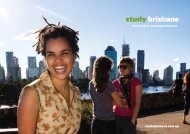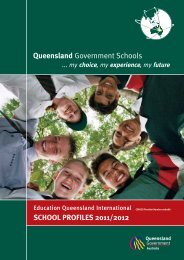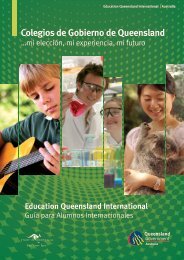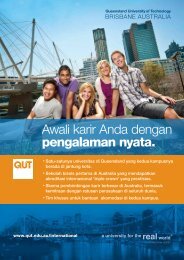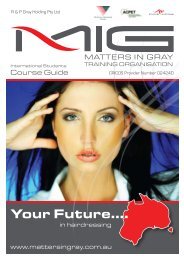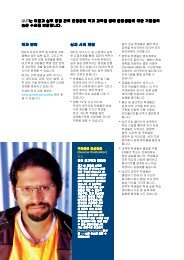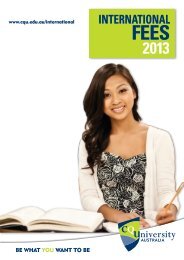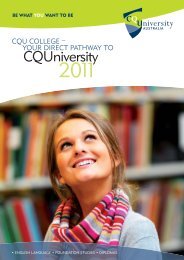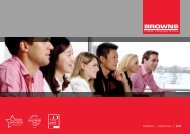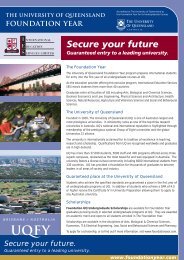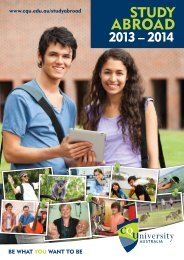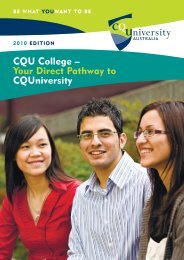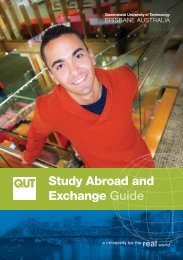UNDERgRADUATE PROSPECTUS - Study Brisbane
UNDERgRADUATE PROSPECTUS - Study Brisbane
UNDERgRADUATE PROSPECTUS - Study Brisbane
- No tags were found...
Create successful ePaper yourself
Turn your PDF publications into a flip-book with our unique Google optimized e-Paper software.
Bachelor of<br />
Dental Science<br />
Program code 2257<br />
Location St Lucia (Year 1), Herston<br />
Commencement semester 1<br />
Duration Five years full-time<br />
Admission requirements Year 12 or equivalent<br />
English, Mathematics B, and one subject from<br />
Biological Science, Chemistry or Physics (Chemistry<br />
recommended) (see page 92)<br />
Additional entry requirements Evidence of status<br />
of blood-borne viruses (Hepatitis B, Hepatitis C, HIV)<br />
and comply with School guidelines. International<br />
applicants must sit the International Student<br />
Admissions Test (ISAT). For information on ISAT see<br />
the Australian Council for Educational Research<br />
(ACER) website: www.acer.edu.au/isat<br />
English language proficiency IELTS overall 7,<br />
reading 7, writing 7, speaking 7, listening 7<br />
Honours A modified program of study in Years 4<br />
and 5, with entry based on grade point average<br />
Program outline<br />
UQ’s Dental School has been providing dentists since<br />
1937. The oldest and most established dental school<br />
in Queensland, it has been located at Turbot Street,<br />
in <strong>Brisbane</strong>’s CBD, since 1941 and is scheduled to<br />
move to the new Oral Health Centre at UQ Herston<br />
in 2013. The Centre will be Australia’s largest and<br />
most advanced tertiary oral health facility, combining<br />
research, education, training, and specialist expertise<br />
in patient care. Teaching facilities will include clinical<br />
simulation areas, pre-clinical laboratories, lecture/<br />
seminar rooms, and research laboratories.<br />
The Bachelor of Dental Science (BDSc) program<br />
has been accredited by the Australian Dental<br />
Council, and will provide you with the opportunity<br />
to spend the final year in state government dental<br />
clinics throughout Queensland as well as in the new<br />
Oral Health Centre, enabling you to extend and<br />
further develop your clinical skills and experience<br />
before graduation.<br />
The program will provide you with the knowledge,<br />
skills and attitudes required to become a competent<br />
practitioner of dentistry. These include applying<br />
scientific principles to preventing, diagnosing and<br />
treating oral diseases and abnormalities. You will be<br />
introduced to dental practice and oral rehabilitation<br />
in the first year, and also undertake courses in oral<br />
biosciences and biomedical foundations in oral health.<br />
The remaining four years of the program involve<br />
three years of applied dental science and one year<br />
of extramural clinical practice (34 weeks). Clinical<br />
work commences in second year and is broadened<br />
in the third and fourth years of study. You will be<br />
assigned patients, and will then be responsible for<br />
their dental care. Clinical work in areas such as general<br />
practice dentistry, orthodontics, paediatric dentistry,<br />
periodontics and prosthodontics is undertaken at the<br />
Dental School. You will gain experience in the areas<br />
of oral medicine and oral and maxillofacial surgery in<br />
<strong>Brisbane</strong> teaching hospitals. The final year of study<br />
provides external clinical experience. You will be<br />
rotated through a variety of state government health<br />
clinics throughout Queensland, including rural, school,<br />
hospital and community clinics.<br />
Placement courses<br />
The final year of the BDSc program involves 34<br />
weeks (two semesters) of clinical placement in state<br />
government health clinics throughout Queensland,<br />
including rural, school, hospital and community<br />
clinics. These clinics are located in districts such<br />
as Ipswich, Gold Coast, Logan, Redcliffe, Kawana,<br />
Nambour, Caboolture, Mackay, Maryborough,<br />
Bundaberg, Rockhampton, Charters Towers, Cairns<br />
and Townsville. You will incur varying travel and<br />
accommodation costs depending upon clinical<br />
placement and location.<br />
Additional information<br />
Dental Board of Queensland policy prevents dentists<br />
carrying blood-borne viruses from undertaking<br />
invasive procedures, the definition of which includes<br />
most aspects of clinical dentistry. If you carry<br />
blood-borne transmissible viruses you will not be<br />
permitted to enrol. Tuberculosis (TB) screening is<br />
also required in accordance with Queensland Health<br />
recommendations.<br />
You must have a current Blue Card (Working with<br />
Children Check) and undertake a police check for<br />
criminal history before commencing placements/<br />
practicums.<br />
You must also complete a nationally accredited<br />
Senior First Aid Certificate in Year 1. You will<br />
also be required to complete a Cardiopulmonary<br />
Resuscitation (CPR) competency recertification<br />
course in Years 2, 3 and 4, and complete a<br />
Senior First Aid competency acquisition course<br />
(Recertification) before commencing Year 5.<br />
Career opportunities<br />
Private practice: a dentist may work either on<br />
their own behalf or as an assistant with an<br />
established practitioner, in a partnership, or as<br />
locum tenens; Government public health: in<br />
government and school dental clinics; Defence<br />
force: dentists may enter the Navy, Army or<br />
Air Force as dental officers on short service or<br />
permanent basis.<br />
Additional cost<br />
– Annual CPR recertification (approximately $55)<br />
– Dental instruments kit ($700)<br />
– Travel and living expenses associated with<br />
placements, some of which may be outside the<br />
<strong>Brisbane</strong> metropolitan area<br />
– First Aid re-certification (approximately $120)<br />
– Senior First Aid Certificate (including CPR)<br />
(approximately $155)<br />
– Incidental course materials ($150)<br />
– Learn-a-Prep block ($60)<br />
– Police check for criminal history ($45)<br />
– Prosthodontic instruments ($300)<br />
International contact details<br />
International Student Advisor<br />
Online: www.uq.edu.au/international/enquiry<br />
Phone: within Australia (free call): 1800 671 980<br />
Outside Australia: +61 3 8676 7004<br />
Bachelor of<br />
Exercise and<br />
nutrition Sciences<br />
Program code 2325<br />
Location St Lucia<br />
Commencement semester 1, 2<br />
Duration Three years full-time<br />
Admission requirements Year 12 or equivalent<br />
English and one of Biological Science, Chemistry or<br />
Physics (see page 92)<br />
Honours Available as an additional year of study,<br />
with entry based on grade point average<br />
Program outline<br />
The Bachelor of Exercise and Nutrition<br />
Sciences is offered to students wishing to gain a<br />
generalist background in the exercise sciences and<br />
nutrition sciences. This program offers students<br />
the opportunity to undertake a breadth of study<br />
in the field of human movement studies (e.g.,<br />
biomechanics, motor control, exercise physiology,<br />
sport and exercise psychology) and nutrition (e.g.,<br />
food science, food and society, nutrition and<br />
disease).<br />
You will commence the program with a suite of<br />
core biological, movement science, social and health<br />
courses, and can then enrol in in both nutrition and<br />
exercise science areas within the set list.<br />
Career opportunities<br />
This degree will not offer specific professional<br />
preparation but will serve as an important entry<br />
point into postgraduate honours and a range of<br />
postgraduate coursework programs including the<br />
Master of Dietetics.<br />
International contact details<br />
International Student Advisor<br />
Online: www.uq.edu.au/international/enquiry<br />
Phone: within Australia (free call): 1800 671 980<br />
Outside Australia: +61 3 8676 7004<br />
Bachelor of<br />
Exercise and Sport<br />
Sciences<br />
Program code 2314<br />
Location St Lucia<br />
Commencement semester 1<br />
Duration Four years full-time<br />
Admission requirements Year 12 or equivalent<br />
English and one of Biological Science, Chemistry or<br />
Physics (see page 92)<br />
Honours A modified program of study in Years 3<br />
and 4, with entry based on grade point average<br />
Program outline<br />
This program explores the complex nature of human<br />
movement and how the body reacts to acute and<br />
chronic physical activity pursuits such as general<br />
fitness regimens, recreational activities and elite sports.<br />
In this program, you will gain a solid understanding<br />
of key biological, social and health sciences, as well<br />
as core knowledge in the fields of biomechanics,<br />
motor control, exercise physiology, exercise and sport<br />
psychology, and functional anatomy. You will learn<br />
in a variety of professional settings to gain extensive<br />
practical experience and prepare for professional<br />
practice in exercise science and related areas.<br />
After a year of study, you may enrol in a Clinical<br />
Exercise Physiology (CEP) major, which covers all<br />
aspects for you to be eligible for a Medicare provider<br />
number to practise as an Accredited Exercise<br />
Physiologist (AEP)*. You will learn specialist skills<br />
in the prescription and management of exercise<br />
for different client groups, including the elderly and<br />
people with chronic illnesses (e.g., cardiovascular<br />
disease and neurological conditions).<br />
Additional information<br />
* Entry into the Clinical Exercise Physiology (CEP)<br />
major is based on grade point average at the<br />
completion of the first year with a quota of 40 places.<br />
If you work with children as part of a required<br />
placement course, you must have a current Blue<br />
Card (Working with Children Check).<br />
Placement courses<br />
Exercise and Sports Science stream: 400 hours of<br />
field experience related to exercise and sports science.<br />
Clinical Exercise Physiology major: 500 hours of<br />
practicum experience related to exercise delivery for<br />
low risk and clinical populations.<br />
Career opportunities<br />
Sports science, cardiac science, clinical<br />
measurements, exercise science testings,<br />
clinical (accredited) exercise physiologist,<br />
corporate health and fitness advisor, strength<br />
and conditioning coach, sports development<br />
officer, community recreation and fitness officer,<br />
health promotion officer in: rehabilitation clinics<br />
and hospitals; multi-professional healthcare<br />
clinics; sports medicine clinics; sports academies<br />
and institutes; private practice; health and<br />
fitness centres; Commonwealth, state and<br />
local government departments; professoional<br />
association; sporting associations and teams.<br />
52<br />
UNDERGRADUATE <strong>PROSPECTUS</strong> FOR INTERNATIONAL STUDENTS 2012



